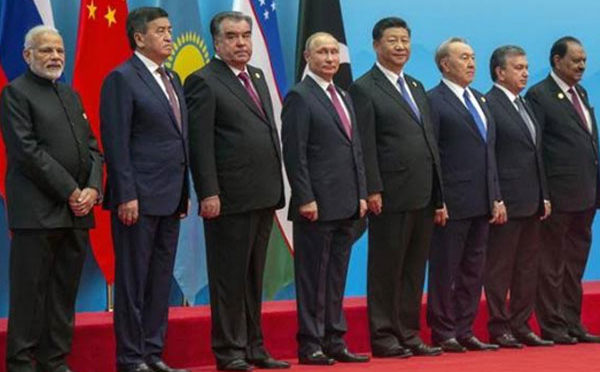India and the Shanghai Cooperation Organization
Posted on : February 3, 2020Author : AGA Admin

The dominance of international relations by the United States and its allies is a well known and well accepted fact of the global political atmosphere. However, with the establishment of the Shanghai Cooperation Organisation(SCO) in the early years of the millennium, there had been wide speculations about the part that the SCO may play in balancing the scales of global influence in its favour. The SCO is also commonly known as the “Shanghai Pact” and finds its origin in the “Shanghai Five” established in 1996 with China, Russia, Kazakhstan, Kyrgyzstan, and Tajikistan. Over the years, Uzbekistan, India and Pakistan have acceded to become members of the organisation. SCO also has observer nations as Iran and Afghanistan and dialogue partner states such as Turkey and Belarus.
The geostrategic significance of the SCO cannot be overlooked considering that it is multilateral forum which has the membership of the Central Asian Republics along with the presence of Russia and China which have been acting as strong players in the game of world politics. India has long displayed an unwavering interest in strengthening its position in the international forum, in this regard India’s membership and its role within the SCO becomes an important domain of Indian foreign policy. Two primary dimensions of India’s prospective gains from the SCO become apparent, which are, connectivity and security.
Connectivity and Trade
As part of India’s policy to connect with Central Asia, SCO becomes an important pedestal. Prime Minister Modi in each of the SCO summits that he has visited has emphasized on the importance of economic development through trade and connectivity. A general world view that exists is that India acts primarily in a South Asian context and field. In order to do away with shackling preconception, India’s deeper involvement with the SCO becomes necessary. The Pan-Asian trajectory of India’s foreign policy will be easily bolstered with the development of strong ties with the SCO as well as the member states. India’s Pan Asian involvement may also strengthen its stand against the Chinese Belt and Road Initiative(BRI), which has been a flagship initiative and has received support from a multitude of Asian nations.
Throughout history the influence on art, culture, language and trade exerted by Central Asia has been substantial, even the origins of the Mughal dynasty can be traced back to the Central Asian Region. Despite this historical association, the bilateral economic trade between India and the Central Asian Countries has been very weak. In 2013, India’s trade with Central Asian countries was as low as 500 million USD.
One of the crucial reasons for the lack of flourishing of trade between India and Central Asian states is that there is no direct access. India has to either trade with Central Asia through China or through Europe via Russia, thus making it an expensive affair. Chabahar port in Iran has provided some convenience but in a limited way. India could look to use the SCO for exploring an alternative route to the CAR.
Therefore, while the SCO continues to be an important multilateral platform, it can also serve to be a facilitator for improving bilateral trade and strategic relations. With the idea of a Free Trade Agreement for the SCO being a definite prospective, it can be expected that bilateral trade would exponentially increase with the SCO countries.
Cooperation with the SCO on matters of energy is also important since the Central Asian Region(CAR) supplies ten percent of oil and energy to the world. Certainly, India would like to ensure a consistent source of energy supply in an increasingly uncertain global economy, in this regard the geo-economic and geostrategic benefits of having positive relations with the SCO become necessary. India’s pending energy projects like the TAPI (Turkmenistan-Afghanistan-Pakistan-India) pipeline, IPI (Iran-Pakistan-India) pipeline, and CASA (Central Asia-South Asia)-1000 electricity transmission projects — all of which are blocked, due in part to Pakistan’s recalcitrant approach — can get a much needed push through the SCO.
Security
The SCO, since its formation, has had a focus on primarily fighting “three evils” which are, terrorism, separatism and extremism. Therefore, non traditional security and counter terrorism has been on the top of SCO’s priority list. In 2005, SCO established the Regional Anti Terrorism Structure (RATS) in Tashkent, Uzbekistan. This structure works on sharing of intelligence and coordinating counterterrorism measures between the member states. According to official statistics, the SCO because of the intelligence acquired through RATS could neutralise six hundred planned attacks and could extradite close to five hundred terrorists.
The areas which India could work being a part of the SCO are intelligence sharing, law enforcement, developing counter terrorism practices and technologies, mutual legal assistance, extradition arrangements and capacity building. Drug trafficking from Afghanistan is another major thrust area which can be worked upon through the SCO.
There have been frequent rumbles over intelligence sharing within RATS because Pakistan is also a part of the organization. As New Delhi considers Pakistan to be a sponsor of terrorism and the issue over Kashmir has never died down, coordination does become a thorny issue. However, despite such issues India participated in SCO’s counter terror military exercises which included troops from Pakistan.
While concluding, some light has to be thrown on the issues that can damage India’s role within the SCO. Issues such as the rise of volatility in Afghanistan, the fragile position of Kashmir, China’s aggressive stance on Belt and Road Initiative, the growing closeness of Russia and China on a number of matters can easily hamper India’s position in the organisation. However, despite such intricate issues, the organisation is the best possible option in the current world scenario for India to improve its relations with Central Asia and work on counterterrorism.
Megha Singh
Post Graduate Student at TISS, Mumbai and Intern, AGA
References
- Cabestan, J.-P. (2013). The Shanghai Cooperation Organization, Central Asia, and the Great Powers, an Introduction: One Bed, Different Dreams? Asian Survey, 53(3), 423–435.
- Kocamaz, U. (2019). The Rise of New Powers in World Politics: Russia, China and the Shanghai Cooperation Organization . International Relations, 16(61), 127–141.
- Desai, S. (2017, December 5). India’s SCO Challenge. The Diplomat.
- Business Today Network, Imran Khan may give SCO Summit 2020 in India a miss amid tensions. (2020, February 24). Business Today.
- Roy, S. (2019, June 13). Explained: What SCO summit means for India’s global and regional interests. The Indian Express.





Leave a Reply